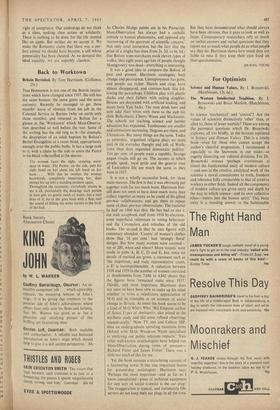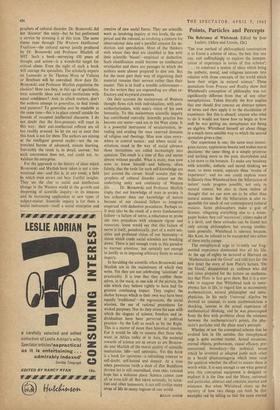For Optimists
Science and Human Values. By J. Bronowski. (Hutchinson, 12s. 6d.)
Is science 'mechanical' and 'amoral'? Are the values of scientists distinctively 'other' than, or alien to, those of lesser mortals? These are among the. perennial questions which Dr. Bronowski explores, all too briefly, in the lectures reprinted in Science and Human Values. This is a timely book—even for those who cannot accept the author's cheerful pragmatism. I recommend it especially to the Snowmen in our midst—so eagerly dissecting our cultural divisions. For Dr. Bronowski stresses (perhaps overstresses at times) the fundamental unity of modern culture --and sees in the creative, analytical work of the scientist a moral commitment to truth, freedom and tolerance fully comparable to that of creative workers in other fields. Indeed all the components of modern culture are given unity and depth by the way in which science—and its own collective ethos—'enters into the human spirit.' This basic unity is a standing answer to the fashionable
prophets of cultural disorder. Dr. Bronowski did not 'discover' this unity—but he has performed a service by stressing it at this time. The same theme runs through The Western Intellectual Tradition—the cultural survey jointly produced by Dr. Bronowski and Professor Mazlish of MIT. Such a book—surveying 450 years of thought and action—is a wonderful target for critical abuse. Even the sight of such a book will outrage the specialists. The scholarly experts on Leonardo or Sir Thomas More or Voltaire or Bentham will be convulsed. How dare Dr. Bronowski and Professor Mazlish popularise the classics? How can they, in this age of specialism, treat scientific ideas and social institutions with equal confidence? And, to clinch matters, don't the authors attempt to generalise, to find trends and patterns? To generalise and be readable at the same time—this is to place oneself outside the bounds of accepted intellectual discourse. I do not doubt that the bien-pensants will react in this way : their anti-intellectual reflexes are all too readily aroused. So let me say at once that this book is not for them. The authors are aiming at the intelligent general reader—not the en- trenched barons of advanced, minute learning. Inevitably the result is, in detail, uneven : but such unevenness does not, and could not, in- validate the enterprise.
For the approach to the history of ideas which Bronowski and Mazlish have taken is not a con- ventional one—and this is, in any event, a field in which even errors can bear fruitful insights. They see the clue to social and intellectual change in the Western world in the growth and deepening of scientific inquiry—in its tensions and its increasing application to new types of subject-matter. Scientific inquiry is for them a social instrument—itself a social enterprise and creative of new social forms. They see scientific work as involving inquiry at two levels, the em- pirical and the rational, as involving a concern for observational data and a parallel concern for de- duction and speculation. Most of the thinkers with whom they deal are classified in line with their scientific 'biases'—empirical or deductive. Such classification could become an intellectual straitjacket and there are passages in which the authors seem almost prepared to don one. But for the most part their way of organising their material remains their servant rather than their master. This is in itself a notable achievement— for the writers they are expounding are often re- fractory and wayward creatures.
On their account the mainstream of Western thought flows rich with individualism, with anti- authoritarianism, with man's vision of his own humanity. To this mainstream scientific inquiry has contributed centrally. Scientific practice has become our norm—and not in the West alone. It is a powerful instrument of secularisation, in- vading and eroding the once reserved domains of religion and theology. Man now aims every- where to control nature: and where social in- stitutions stand in the way of social advance those institutions are called increasingly into question. The result is a time of flux and unrest almost without parallel. What is more, man now aims to know himself—and believes, often falsely, that the tools for such self-knowledge are just around the corner. Small wonder that the prophets of cultural disorder cannot see the underlying unity and continuity of Western life. . . . Dr. Bronowski and Professor Mazlish imply that our knowledge of man in society is less coherent than our knowledge of nature because of our classical failure to integrate empirical with deductive procedures. Perhaps so. It may also be the result of a more fundamental failure—a failure of nerve, a reluctance to probe our own prejudices with adequate rigour and resources. Some would say that this failure of nerve is itself, paradoxically, part of a more sen- sitive and profound vision of our humanity—a vision which crude social scientists are breaking down. There is just enough truth in this paradox to warrant attention; but certainly not enough to justify us in imposing arbitrary limits to social inquiry.
In heralding the scientific ethos Bronowski and Mazlish are in the mainstream of which they write. Yet they are not celebrating 'scientism' or practicality. It is true that they confine them- selves, in the main, to one side of the picture, the side which they believe rightly to have had the greatest continuing impact. They neglect the darker byways which in their own way have been equally `traditional'—the regressions, the social atavism, the use of rational procedures for wicked purposes. Nor do they stress the ease with which the slogans of science, freedom and in- dividualism have been perverted in political practice—by the Left as much as by the Right. This is a matter of more than historical interest. For it would be idle to assume that those who want, in Africa today or in Asia, the material rewards of science are as aware as are Bronow- ski and Mazlish of the moral quality of scientific institutions. Idle—and optimistic. Yet this book is a book for optimists—a refreshing contrast to self-doubt, self-hatred and despair. At a time when pessimism (with a dash of Zen Buddhism thrown in) is still overvalued, even chic, rational hope has a welcome place. Science, cannot cure all or even kill all. But taken seriously, by scien- tists and other humanists, it can still civilise many areas of life in many regions of our world.
JULIUS GOULD







































 Previous page
Previous page